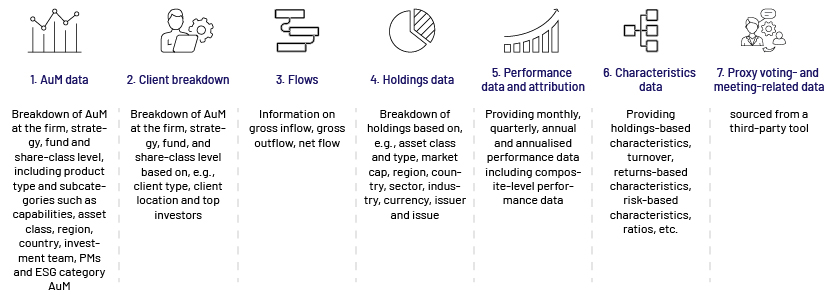Published on March 11, 2024 by Kishan K
In the fast-paced world of asset management, where precision and timeliness are paramount, the specialised role of product marketing data specialist has emerged to meet customer demand and ensure the smooth functioning of internal teams. This blog delves into the significance of this role and why it is indispensable for any organisation in the asset management sector.
We set up this role for one of our US-based, publicly listed asset management clients. It had a profound impact on its request for proposal (RFP) team, increasing efficiency in terms of completing highly complex RFPs within specified deadlines. This saved valuable time but also reduced the burden on both the RFP and sales teams, as this specialist handled all the quantitative data sections of the RFP request. Our client won the mandate and attributed the success to the high standards met by the documents they presented.
Why a product marketing data specialist?
The role of a product marketing data specialist is to support the RFP team, focusing on the quantitative aspects of RFP, RFI and DDQ requests and any ad hoc client queries. Beyond assisting the RFP team, these individuals also support sales teams, product specialists, presentation teams, marketing collateral teams, project managers and other client-facing teams. They play a pivotal role in ensuring that these teams have access to accurate and timely data for recurring requests, ad hoc queries, client presentations and meetings.
Therefore, these analysts need to have a comprehensive understanding of the different systems, fast learning skills and an analytical mindset to navigate data streams. Coordinating with multiple teams requires adept multi-tasking skills and the ability to manipulate raw data effectively. Financial knowledge is crucial, including experience in the asset management sector and asset classes and familiarity with client-requested datasets. Knowledge of market regulations in the different countries is essential. The analysts should possess advanced Excel skills and proficiency in office tools to deliver refined, strategic insights aligned with the organisation's dynamic requirements and industry standards.
Why a marketing data team?
In the asset management sector, all teams in a distribution department, especially the RFP team, faces challenges relating to data accessibility. This is compounded by the complexity of tasks such as coordinating with multiple teams, tracking progress, verifying data sources, performing manual calculations for historical data and later dealing with the intricacies of proofreading and quality checking.
Adding to the complexity is the fact that every RFP, RFI and DDQ request comes with specific deadlines, some of which are very tight. The introduction of concepts such as environmental, social and governance (ESG) and the Sustainable Finance Disclosure Regulation (SFDR), and the increase in number of platform requests, such as for DOOR, Asset Q or DiligentVault, has increased the complexity. Managing both the qualitative and quantitative questions in these requests is a substantial undertaking for the RFP team. The process involves multiple tasks, including reaching out to subject-matter experts (SMEs) from different teams and maintaining constant communication, including regular meetings, throughout the process until submission.
The invaluable role of the marketing data team
The role of the marketing data team goes hand in hand with that of the RFP team. The are responsible for handling all the quantitative aspects of these requests, including historical and current data such as assets under management (AuM), breakdown of AuM, performance metrics, holdings and their characteristics, risk data, proxy voting and meeting data.
If necessary, the marketing data team collaborates with other SMEs, including the performance, risk and product teams. This collaborative approach not only reduces the burden on the RFP team, but also saves time and minimises confusion relating to calculations derived from different data sources. Minor miscalculations could lead to significant errors in the overall data provided.
Roles and responsibilities of the product marketing data specialist

1. Understanding client needs: Marketing data specialists work closely with the RFP team and other client-facing teams. They actively participate in kick-off calls to understand project requirements, deadlines, goals and expectations, seeking clarity if needed. They also handle direct requirements received via email.
2. Data collection: They gather data from different tools and source links. If the necessary data is not available via specific tools, they proactively reach out to SMEs.
3. Project management: When a request is assigned, the analyst takes ownership of the entire project. They work independently, ensuring tasks are completed within deadlines and that they fully understand the details of the request.
4. Data analysis and calculation: Based on the collected data, they interpret client questionnaires and calculate data in line with project requirements. They are well versed on internal checklists and methodologies for data calculation.
5. Collaboration: They collaborate with teams such as the performance, risk and analytics team to access data beyond the marketing data team’s control.
6. Data quality assurance and review: Senior specialists review and verify numbers, suggesting changes for accuracy.
7. Submission and documentation: Once the quality checks are completed, they submit documents to the RFP team and maintain documentation for future reference.
Types of data managed
This team is responsible for providing the following current and historical data:

Conclusion
In the competitive world of asset managers, winning and retaining clients is no easy feat. However, success depends on consistently delivering accurate and timely information for client analysis. This ensures that clients receive the necessary data promptly and eases the workload on essential teams such as the RFP team, presentation team, sales team and client portfolio managers. The product marketing data team is the backbone of these teams. We forecast a future where data management not only streamlines the operation, but also pioneers data-driven decision making. As technology advances the team’s role would become more critical in helping an organisation to adapt to changing client needs and market dynamics, ensuring a competitive edge and sustained success in the dynamic world of asset management.
How Acuity Knowledge Partners can help
Our team of specialised analysts is dedicated to assisting clients; we added the following value to this particular client:
-
Cost reduction: Outsourcing to Acuity reduced costs significantly.
-
Experience: Our team comprises highly experienced analysts with a proven track record in this field.
-
Enhanced accuracy and speed: After partnering with Acuity, the client has seen remarkable improvements in accuracy and speed of project completion. The positive feedback shared at meetings and via emails and C-Sat surveys increased our confidence, and we added one more analyst to the team.
-
Day-to-day group email inbox management: Our client has a global presence, but since the client team operates primarily from the US, other teams that needed data for urgent ad hoc requests had to wait until US working hours to obtain it. However, with Acuity analysists onboard, we now provide coverage during Asia and EMEA hours. This has significantly reduced the burden on the client and ensures the stakeholders receive the necessary data without delay.
-
Looking for automation: Our analysts are also actively exploring possibilities of automation and other ways to expedite project completion without compromising quality and accuracy.
We offer services in line with responsibilities across geographies and asset classes, including marketing, reporting and investment communication. We currently support prominent fund managers in compiling RFPs/DDQs and marketing collateral and help with consultant databases and investment commentaries. We also offer a broad range of marketing material support as part of our financial marketing services, combined with our rich experience in working with professional software. Our customised and integrated technology solutions offer more flexibility than off-the-shelf software for fund factsheets. We also offer Seismic slide library management support, support with migration and regular maintenance and overall insight to ensure clients' financial marketing material and fund brochures are up to date.
Tags:
What's your view?
About the Author
Like the way we think?
Next time we post something new, we'll send it to your inbox







